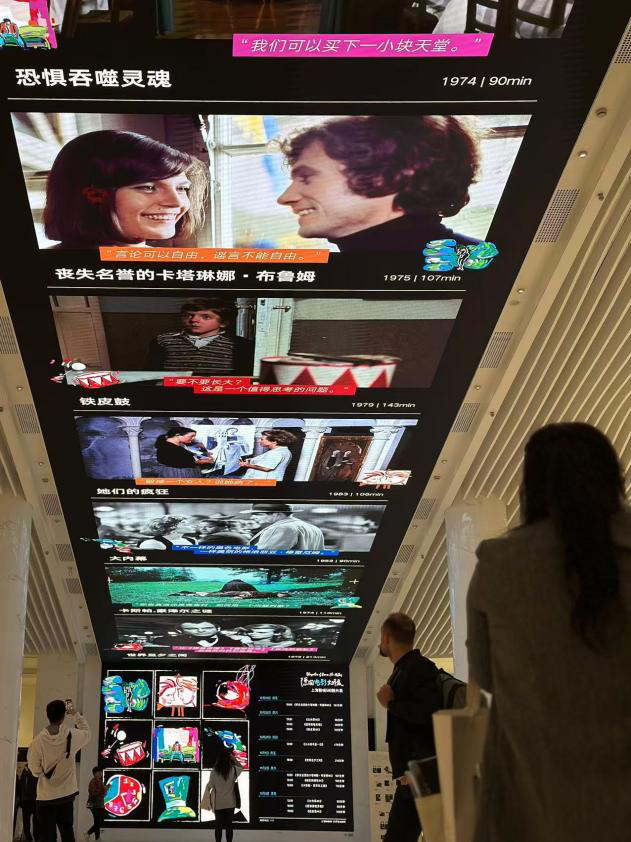
The “German Film Masters Exhibition,” organized by the Shanghai International Film Festival Center with guidance from the Shanghai Film Bureau, concluded last weekend. This exhibition marked the debut of the newly launched SIFF SCREENING program at the Shanghai International Film Festival, featuring 12 screenings held over two weekends from October 25 to 27 and November 1 to 3 at the Shanghai Film City (SHO). The showcased films, spanning from 1953 to 1983, allowed audiences to experience one of the most vibrant periods in German cinema through eight classic films by five German film masters.
This film festival covered a variety of genres including science fiction, war, family, crime, women, and romance, showcasing both renowned classics and newly restored cinematic gems. The representative work “The Enigma of Kaspar Hauser” by New German Cinema giant Werner Herzog sold out soon after tickets were released. Margarethe von Trotta's uniquely personal film “The German Sisters,” Rainer Werner Fassbinder's “In a Year of 13 Moons,” and Volker Schlöndorff’s Oscar-winning film “The Tin Drum” were also close to selling out.
Many viewers expressed appreciation for the film selection, curation, and viewing experience. A user from Xiaohongshu named “Tomato Lycopene” shared their renewed emotions after watching the restored version of “The Great Inside” and their long-time favorite “Fear Eats the Soul” in the theater: “Film is an art meant for cinema. Watching online before only evoked sympathy and pity for the characters, but in the theater, the audiovision combined with the music immersed me in emotions. The romantic moment of Amy and Ali dancing together moved me deeply — that is the irreplaceable significance of cinema compared to online platforms.”

The 2K restored version of “Eight Hours Is Not One Day” was screened in a cinema for the first time in mainland China, making it a standout feature of this exhibition. This important work from Fassbinder’s transitional period features a total running time of nearly eight hours. The marathon-style screening, from noon to 10 PM, maximized the presentation of this classic masterpiece, while breaks were scheduled to enhance the audience's comfort. Additionally, a specially designed frame-by-frame display based on the content of each episode was shown before each screening, offering fans a unique keepsake.
After the screenings, many film enthusiasts shared their thoughts on social media platforms. A user named “ToD” described it as the longest cinema experience, noting that bringing a back support was a wise choice; another user, “偏问西东-香耳,” expressed that they didn’t feel fatigued and didn't want the film to end; while “绿林穿行” appreciated the extraordinary viewing atmosphere, stating that the gentle, positive, free, and powerful energy contained in the work healed the audience.

The Shanghai International Film Festival, held every June, has already become a grand event for film lovers. Beyond this, the festival also persists in organizing a series of regular film exhibitions outside of the festival period, aiming to extend the aesthetic education function of the Shanghai International Film Festival and provide richer and more diverse film content, creating a more participative viewing atmosphere. Following the “2022 French Film Masters Exhibition” and the “2023 Spanish Film Masters Exhibition,” this year, the SIFF SCREENING brand regular exhibition has been introduced. Reflective of the festival's mission, the poster for the exhibition connected the cultural history and folk customs of the 20th century with romantic imagination and rational reflection through hand-painted depictions of eight classic scenes. By curating with a clear theme, the festival hopes to revisit classics while conveying a sense of heritage and contemplation. Accordingly, during the German Film Masters Exhibition, additional activities like film selection guides and academic talks were organized, allowing curators and film critics to lead audiences in a deeper understanding of German film history and the curatorial thinking behind it.



The exhibition also featured a range of merchandise such as posters, notebooks, T-shirts, and more, with the exhibition posters, ticket holders, passport holders, and blind box toys being particularly popular with fans, selling out even during the first week of screenings.
According to reports, planning for the next SIFF SCREENING is already underway, expected to launch a Japanese New Film Exhibition in December, marking the beloved film festival's return to Shanghai after three years.


